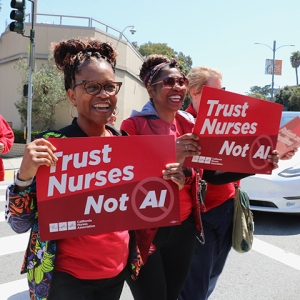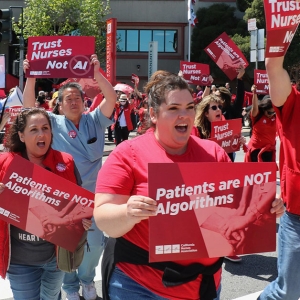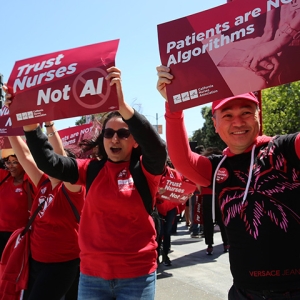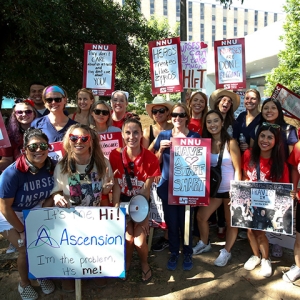A.I.’s impact on nursing and health care
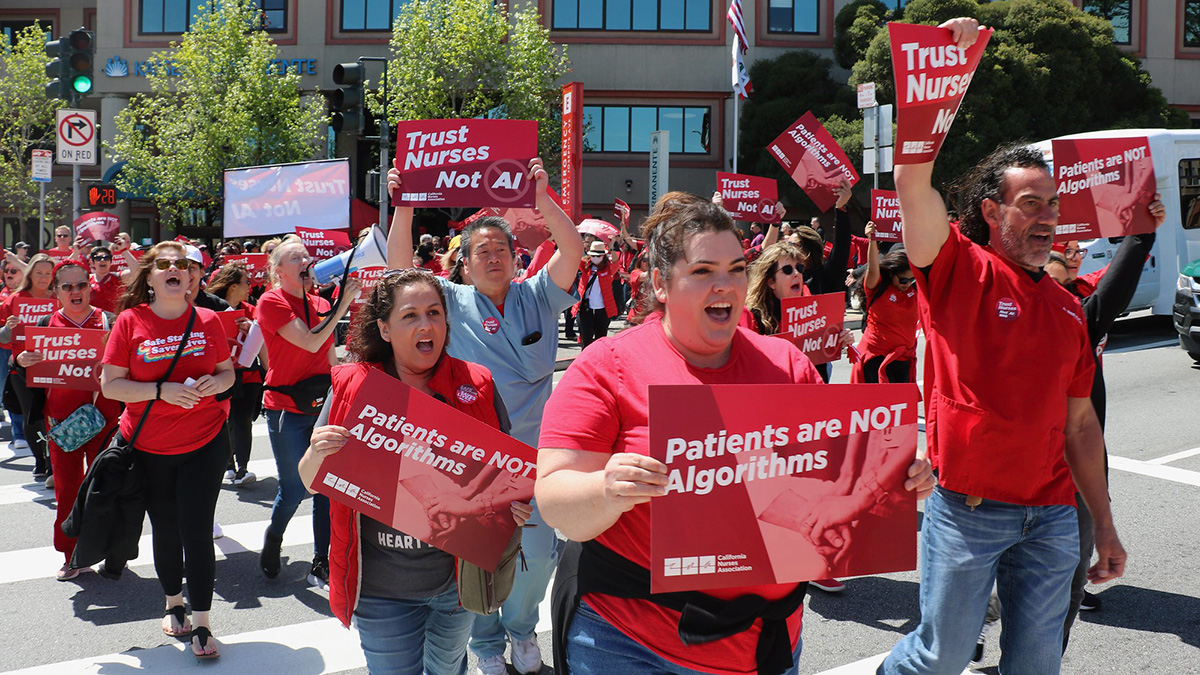
Artificial intelligence (A.I.) is rapidly expanding in all workplaces, and hospitals are no exception. Without our collective action, A.I.’s expansion will accelerate the hospital industry’s race to the bottom and drastically limit nurses’ ability to provide quality care.
What is A.I.?
There are many types of A.I. Simply put: A.I. is technology that attempts to mimic human intelligence, often based on software algorithms, which are rules for calculating or processing massive amounts of data. In the health care context, A.I. and algorithms are often produced based on patients’ Electronic Health Records (EHRs) and other sources of data collected from patients and their environment.
Nurses are not against scientific or technological advancement, but we will not accept algorithms replacing the expertise, experience, holistic, and hands-on approach we bring to patient care.
Nurses know that A.I. technology and algorithms are owned by corporations that are driven by profit — not a desire to improve patient care conditions or advance the nursing profession. The hospital industry, in cooperation with Silicon Valley and Wall Street, will use A.I. to further its dangerous effort to displace RNs from the physical care of their patients prioritizing low-cost or free labor over patient needs.
Key examples of A.I. in nursing
Staffing and scheduling:
- Quantifying nursing workload and patient acuity levels, which influences shift staffing decisions and RN-to-patient assignments.
- Why it’s problematic: Patient acuity measurements – dependent on RNs charting in real-time, which we know is rarely possible, and patient data, which is often incomplete – result in inappropriate nurse-to-patient ratios and unpredictable scheduling (for example, RNs being called in for overtime or sent home early, often on short-notice). Instead, patient acuity measurements should be based on an RN’s holistic/hands-on assessment.
Clinical prediction:
- Flagging potential changes to medical conditions of patients through measurements from biometric and monitoring devices like microphones, video cameras, and sensors.
- Why it’s problematic: This technology forces RNs to respond to excessive, if not faulty, alerts – which sometimes mistakenly flag that a patient’s safety is in jeopardy – rather than using their knowledge and skills of observation to assess how to meet the needs of all patients. Conversely, patients who are at risk for deterioration are often missed by A.I. technology, which would have otherwise been caught by a thorough hands-on assessment from highly-trained medical professionals.
Remote patient monitoring:
- Facilitating models of care that remove RNs from direct patient care. Sensors track patient movements and biometric information, through which patient data is collected and only flagged to an off-site technician or nurse if the algorithm assesses any of the information to be concerning.
- Why it’s problematic: This contributes to an ongoing effort by the hospital industry to maximize revenue by pushing care onto less-skilled medical workers, or even non-medical workers in remote settings (for example, the patient’s home). Over time, this will dramatically limit opportunities for nurses to care for patients in a hospital setting.
Automated charting and nursing care plans:
- Producing step-by-step treatment and care plans outlining interventions and procedures to be performed, including handoff reports to RNs on the next shift.
- Why it’s problematic: Previously, RNs – not algorithmic models – would determine care plans for their patients using their professional judgment and clinical experience. A.I. technology also automatically completes note-taking that can miss important details and nuances about the patient.
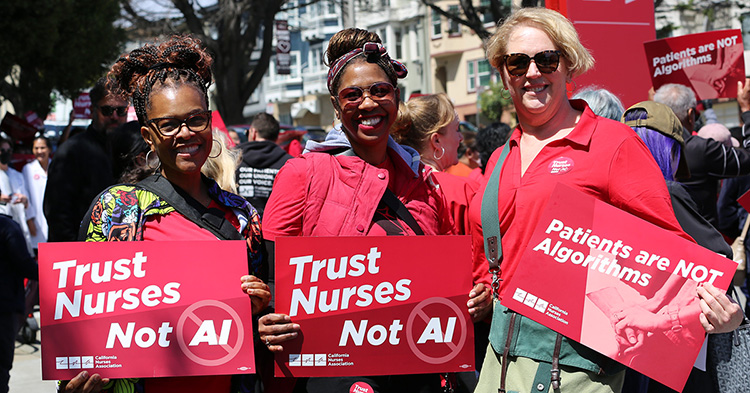
Why should union nurses fight back against the deployment of A.I. in our workplaces?
- Patient care requires — and will always require — nurses. Life-and-death decisions relating to patient acuity, treatment decisions, and staffing levels cannot be made without the assessment skills and critical thinking of registered nurses. For example, tell-tale signs of a patient’s condition, such as the smell of a patient’s breath and their skin tone, affect, or demeanor, are often not detected by A.I. and algorithms.
- Patient care cannot be ceded to A.I. technology, which has been demonstrably prone to serious inaccuracies and biases. In addition to a lack of well-designed research, clinical trials, and post-implementation evaluation, the makers of algorithmic and A.I. software are not required to disclose how their algorithms work or why they produce a given result. A.I. systems as currently deployed are “black boxes” without any transparency and without any input from RNs.
- A.I. creates opportunities for exploitation and scapegoating of nurses. A.I. technologies enable mass surveillance of nurses and other health care workers at facilities, with disturbing opportunities for employers to violate individual privacy and union organizing rights. It also increases the risk of liability for RNs, whose licenses may be on the line for erroneous decisions made by the models, which hospital management and software companies might refuse to accept liability for.
- Profit-driven A.I. threatens to deskill nursing care and put patients at risk. Overreliance on A.I. — and the subsequent fragmentation of RNs’ complex, holistic knowledge into discrete tasks — will undermine RNs’ professional judgment. Assessing patients and developing nursing plans for therapeutic interventions is both an art and science, grounded in education and judgment honed through years of professional experience.
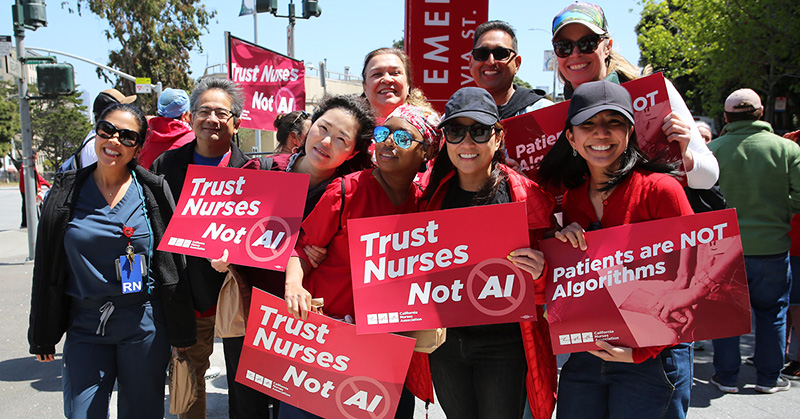
Nurses and Patients’ Bill of Rights: Guiding Principles for AI Justice in Nursing and Health Care
As nurses, we know that the hands-on work of caring for other people cannot and should not ever be automated. The work of registered nurses, and of other health care workers, must be provided in person. No artificial intelligence system will ever replace the human expertise and clinical judgement essential to providing the safe, effective, and equitable nursing care that all patients deserve. Nurses embrace worker-centric technologies that complement bedside skills and improve quality of care for our patients. But we’re concerned about certain technologies that are being implemented into hospital and care settings that do neither. The application of AI in health care settings must follow these principles in order to ensure quality patient care, safety, and equity.
Learn more by reading our guiding principles »
